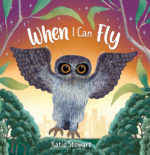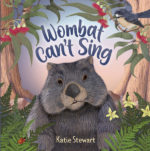Picture book writer and illustrator on the difference between city and country childhoods

My most recent picture book, When I Can Fly, tells the story of a young boobook owl who yearns for the day when he can visit the city from his home in the bush. From afar, he can see the lights and movement and imagines it to be a magical place – much more interesting than the quiet home he knows. So as soon as he can fly, he sets off towards the lights, only to find that what he thought would be amazing is overwhelming.
The story was based on the experience of my country-raised son who spent his high school years begging to be allowed to go to the city. He worked hard to get himself a place at university and set off full of hope for the future, but he discovered that city life was too fast-paced for him and he missed the country more than he expected.
When I tell this story to people in the city, the reaction is generally a puzzled look and the question, ‘Why did he give up?’ Those in the country sigh and say, ‘Oh, I know just how he felt’. So how do we teach children empathy for their counterparts in the city or country (when I refer to the ‘country’, I mean farming communities or stations further out)? One way is to teach them what happens in the other place and to get them to compare and contrast lifestyles.
Communications
City children are used to being able to communicate in any way they choose. Mobile coverage and internet speeds are good to excellent, while in the country, mobile coverage is patchy (if there at all) and internet depends on whether satellite access can be afforded. Both country and city homes can receive world and national news, via the internet, TV, newspapers or radio broadcasts. Local and community news in the country tends to be spread by word of mouth – neighbours contacting each other to pass on information.
Entertainment
Country children have wide open spaces and are closer to nature. They can ride their bikes anywhere, walk for kilometres and still be ‘at home’, build bush cubbies and stargaze at night in a sky with no lights to dim the stars. But slower internet speeds make it harder for them to play on the computer or to stream videos. City children have more access to computer entertainment. Plus, they can play in their backyards or in local parks, and have access to cinemas, museums, libraries, swimming pools, skating rinks and other entertainment venues that country children may not.
Schooling
City children may be lucky enough to have only to walk a little way to school, while others are dropped off and picked up by their parents. Some may catch a train or bus each day. Country children often travel for hours to school by bus, meaning a very early start and a late arrival home. For others, private schooling in the city is the best option, but they have to live away from their home and family for weeks on end. In more remote areas, School of the Air or Distance Education are options. Homeschooling may be an option for both city and country children.
Health
For children in the country, a visit to a doctor or dentist may involve a very long drive. If they need a specialist, they may have to travel to a bigger town or city. Emergency care needing hospitalisation will often involve a long ambulance trip or even a trip by helicopter or the Royal Flying Doctor Service. In the city, doctors, dentists, specialists and large hospitals are often closer to home. One advantage to living in the country is that communicable diseases tend not to spread as easily as in the city.
Nature
Children in the country generally have easy access to nature, especially Australian wildlife. Everywhere they go, if they keep their eyes open, they will see a wide range of flora and fauna. Children in the city may find less or just different kinds of flora and fauna – in parks, zoos and wildlife centres, even in their own back gardens if they look carefully.
Is one better than the other?
There are pros and cons to living in the country or the city and how people feel about them depends on the circumstances of living in a particular place. Some people who live in the city are there because that’s where their work is located. Others live in the country for the same reason. Having the self-awareness to know which they prefer is a skill children need in their lives. They also need to be resilient enough to change their circumstances if they find themselves in the wrong place. Having exposure to both city and country living will help them make those decisions.






